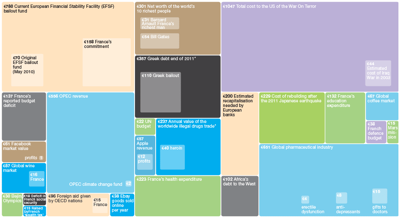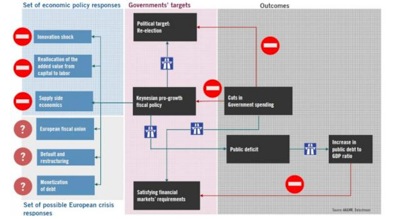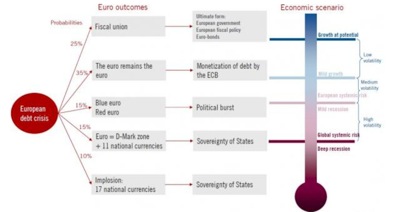It s about time we all, and with great emphasis the bankers, stopped making the euro crisis complicated.
* There are big debts, both you and me, and back and forth between countries. We must acknowledge our personal as well as government debts. We have to pay off the first, our taxes and government spending cuts have to pay off the second. Double whammy, but we got ourselves here...
* There is a banking system out of democratic control and doing what they like, in the aid of none of us. We do not have laws which sensibly govern the city of london, and all the other world centres of finance. This needs to be fixed globally. A big challenge but until we do it there will always be someone who makes a fast buck.
* There is the euro to save, all the people want it, it is a forgone democratic choice. We need stable, valuable money. Not money whose value and predictability is at the whim of a very small group of financiers. The EU is now based on a common currency, break one you break the other. Moreover it is time to consolidate the EU and have all 27 members use the euro.
* We have wealth. In our countries and in our people. Much bigger than simple debts can say. Just look at our level of social cohesion, our stable and democratic governance, our value and beliefs, our patrimony, our technology… we are an advanced society. This has immense value and must not be put at risk by a bad money system
So what to do?
The fundamental problem lies at the door of banks. They loaned too much to people who cannot pay, they constructed excessively complicated "instruments" and "products" to gamble with other people's money (yours and mine). They confused returns and risk and played games with these.
The banks have to be changed to be simple, guardians of our money, and careful investors in stable things that can give us all decent returns. Banks must learn to live within the extent of their loans, for example house values are a risk for the lender as well as the borrower: the market goes down, the equity goes down, the repayments go down… and vice versa.
European governments have to take strong and relentless control of banking, even up to the point of nationalising the lot. They have to redefine the real purpose of money, to trade and invest in society's development.
Next, we all have to stop deluding ourselves, stop or governments spending on projects which have political, but not economic value (take PFI as a stupid example of government mis-management). But also, very importantly, we have personally to pay our debts. It is not enough to want to buy a house or a home we have also to realise that this is a debt that has to be paid. And add that to other loans, on credit cards etc, we must understand that we can be over-extended and at risk of not being able to pay back. We must learn the lesson to live within our means.
Put simply
Give money a real purpose (gold standard anyone?). Pay debts (or write them off ?).




